#1 My journey from an office job to freelance to my startups
While traveling and enjoying life
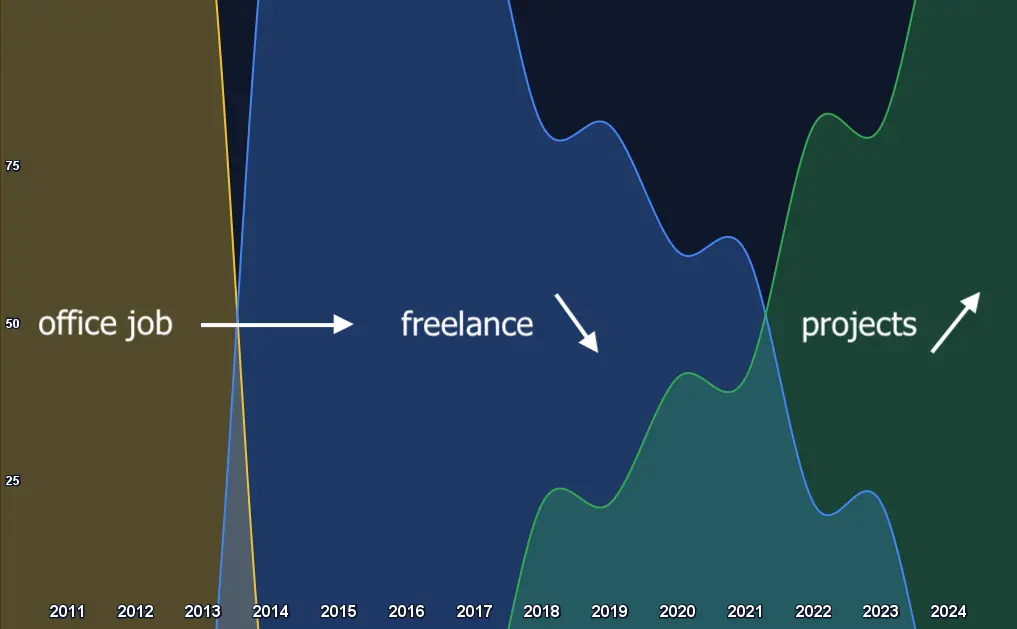
What is it about?
In my previous blog post, I shared my opinion on why you should be brave and publish your project straight away.
Today I share:
- My story of progressively switching from office job to freelance and then to personal projects.
- Obstacles I met and lessons learned.
- My income levels for each year of the journey.
Please note that it's just my way to allocate more time to my projects. It's not ideal, it's not the only one, and it's definitely not the easiest one (I'll write another article on how I would do it now).
Who is it for?
It would be interesting for those who love making things themselves and want more spare time. Also, suppose you are considering moving from an office job to a freelance one. In that case, you may be wondering what benefits and downsides are hiding in the shadows.
Let me tell you about myself to better understand my character and determine if my goals and values are relevant to you. Far before I became a developer - I was 14 and spent a lot of time playing computer games. As any child - I wanted to create my own game. With my rules and mechanics. Thanks to WarCraft 3 Map Editor I was able to customize game resources and make scripts before I knew how to write code.
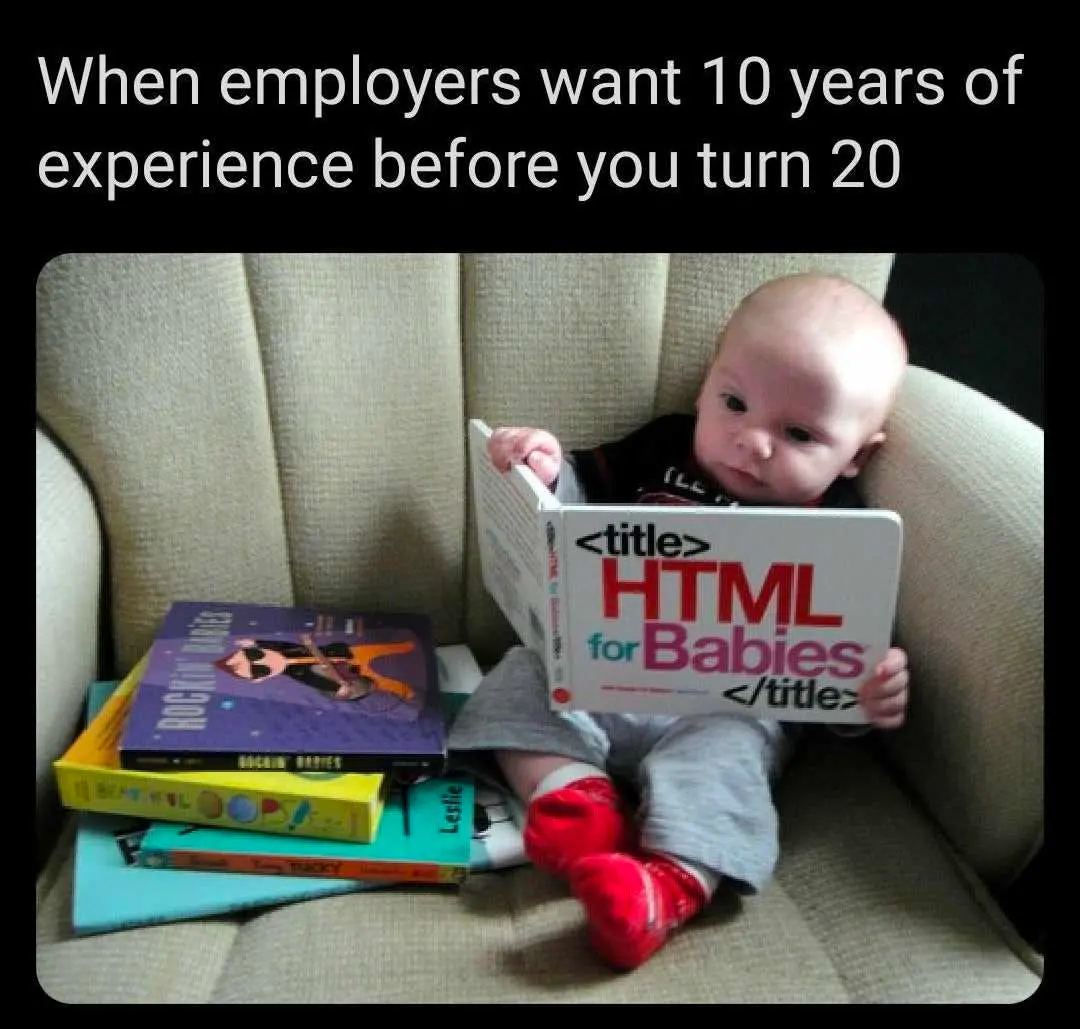
Time passed, and I grew up and worked for other people helping them build their projects. Over the years, I observed my clients' actions. I saw things that I would do differently. My wish to make my own product strengthened, and during the last 5 years, I kept thinking and talking with my friends about my dream.
I built a plan and rules that led me to work on my projects more and more. Currently, I spend about 80% of my time on projects and only 20% on freelance consulting to keep having a positive balance in my bank.
Take more responsibility to maximize experience gained.
Before switching to freelance, I worked in an office as a software developer. It was a regular full-time job after university, nothing special.
Once I gained some experience in building apps and a "senior" prefix to my job title - I started to ask my boss to give me more responsibility. I aimed only for a higher salary at that moment. But as I understood later - taking responsibility is one of the best ways to get experience quick. Lucky me, I got a team leader position.
I lacked experience managing teams and had to learn fast to keep the title. It was tough. To hold the position, I even read a non-technical book to gain knowledge for the first time. But the skills I got became quite helpful for my future.
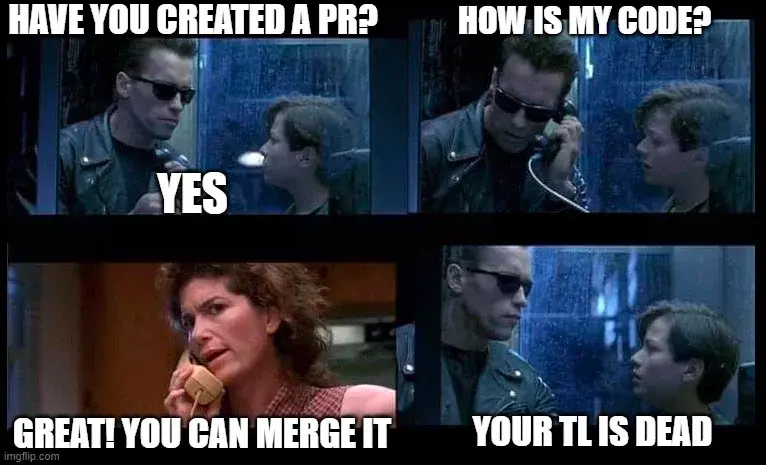
After some time, in 2012, I reached the salary limit in that company, and there was not much new tech stuff to learn or soft skills to develop. My salary was about $1000 per month - the above-average salary in a non-capital city in Russia at that time.
Let's keep track of monthly income, working hours, and hourly rates.
Income State:
- 2010, 1st year of office job, $2.1/hour, 160 hours, $333/month
- 2011, 2nd, $4.2/hour, 160 hours, $666/month
- 2012, 3rd, $6.25/hour, 160 hours, $1000/month
It was the first time I had made a big mistake. As a 22yo guy - I wanted a fancy car. Well, as fancy as I could afford :D
I took a bank loan with a $500/month payment for 3 years.

My favorite car and a reason why I almost got bankrupt
During stable office job time it was fine - I lived with my parents, my expenses
were low, and I used free money for early repayment of the loan.

Plan was as reliable as swiss watch...
Switch from office to freelance job to be more flexible and better control your career path.
In 2013, after three years of office job, I found enough bravery to switch from my office job to freelance. I was not too fond of traffic jams (I'm still not) and wanted more freedom in my work schedule.
I won't lie; leaving the office job was scary. It was like a leap of faith into the unknown. At that time, freelance was not that popular, and it even had a bad reputation in Russia. A lot of myths and stereotypes surrounded it. It was riskier and less stable than a 9-to-6 office job.
Here is a list of obstacles that stood in my way.
Obstacle 1: Limited funds
I was dreaming of leaving my office job. But I couldn't dare until a person I was working with said they tried freelance, and it was not that bad experience. Inspired by their story, I decided to try. I collected money for 4 months of living and left my job. I thought it would be enough. So naive.
It took months to figure out where to look for a job, how to position myself, how to apply, how to fill in profile information to look professional, and dozen other things. But I was running out of money and still couldn't find a job. I was desperate.
I remember a moment when I had just a couple bucks in my pocket, and I was frightened when my girlfriend wanted to buy a pizza. I couldn't afford a pizza! And I still had to pay my car loan every month somehow...
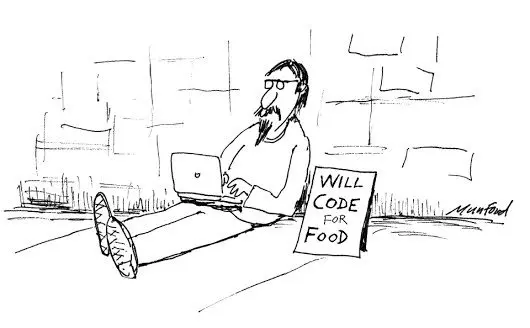
Remediless, I got help from my parents. Although, they had one condition. I had one month to find a contract. Otherwise, they wanted me to return to the "stable" office job. This stimulated me a lot!
Lesson learned: It's probably the most common mistake. Whenever you try to switch to freelance or own a business - you have to prepare 2x or even 3x more than your expected expenses. And you should have a plan B. Because it will always take more time than planned.
Obstacle 2: Russian freelance platforms were terrible.
I tried working there for a few months, but it felt awful. Clients there were expecting cheap labor and wanted to pay $150-300 for a website that took a month of work. They also cheated often and didn't want to pay for work done.
I decided to avoid them and used Upwork.com instead. Clients there were mostly from the US and the EU. They were willing to pay more for the same job. They communicated respectfully and always paid.
Lesson learned: Make sure you do complete research on your options. If I wouldn't know about Upwork - I would stop doing freelance at all or have to stick with Russian platforms.
Obstacle 3: I didn't speak English.
As a non-native speaker, I only learned English in school and additional courses, but no actual speaking practice. I had no problems texting, but many clients wanted to hop on a call to discuss their projects. Without the ability to discuss projects on call, I was limited in the number of freelance jobs available.

Lesson learned: Practice speaking English! Find speaking clubs in your city, hire a tutor or join one of English camps. You don't have to speak perfectly and without a mistake. No! The only rule is - you have to be able to speak without fear. Making mistakes is fine. You'll fix them later.
But the risk paid itself well.
I want to be honest - my life could be completely different if I wasn't lucky at that moment. One day a potential client invited me for an interview. "Hey, let's just try to speak. I see you are shy and trying to avoid the call, but you do not lose anything by trying, right?".
The interview was quite fun. I understood everything the client said but could barely answer. Surprisingly, they were satisfied with my Yes, No, and Maybe, and I got the job! I got a $1000/month income and finally reached my office job salary level! I could pay my bills! I was excited again because it was the fourth month without a stable income, and I was about to abandon my dream.
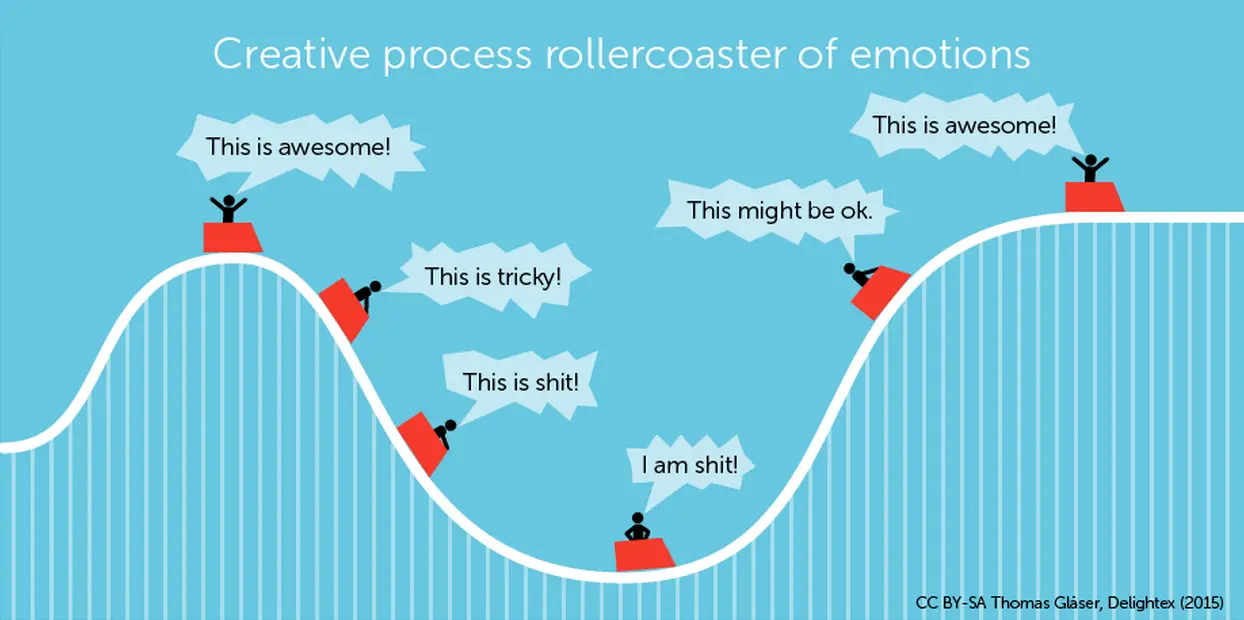
Something that you might feel a lot when you start something new.
Once I got my first money - I paid back my parents, who had supported me over the last months. Without their support, I wouldn't do it. Hey mom and dad! Thank you!
Lesson learned: Sometimes, you need both - work smart and luck, to succeed. I don't know a way to increase luck yet. But exploring opportunities and experimenting definitely leads to big changes.
Over the next 4 months, I worked with that client, and we were on a Skype call for 9 hours every day except Sunday. Listening to the way my interlocutor speaks - I learned. Slowly I talked more and more. I realized that my fear of talking was leaving me. I'm still grateful to that client for the opportunity. It was a turning point in my life. I was even able to pay out my car debt.
After this contract, I found another one and switched to hourly-based pricing for my job.
Income State:
- 2013, 1st year of freelance, $5.2/hour, 192 hours, $1000/month

Money, finally
Keep learning and growing
I had complete control over how I could affect my career now. It was exciting to experiment with different communication techniques, work on my English, and improve my skills as a developer.
Focus on communication (aka "soft" skills)
I realized that good communication and initiative have the most significant impact on how much you can price yourself. Clients value you being honest with them. They like when you provide objective estimations and discuss upcoming barriers and risks. They are happy when you are proactive, give suggestions, and share your opinion about the development process.
I even got myself a couple of raises. One of my clients said it was because for a simple reason - I was the only one willing to sit on a call with them explaining technical things. Things that were confusing them until everything became clear.
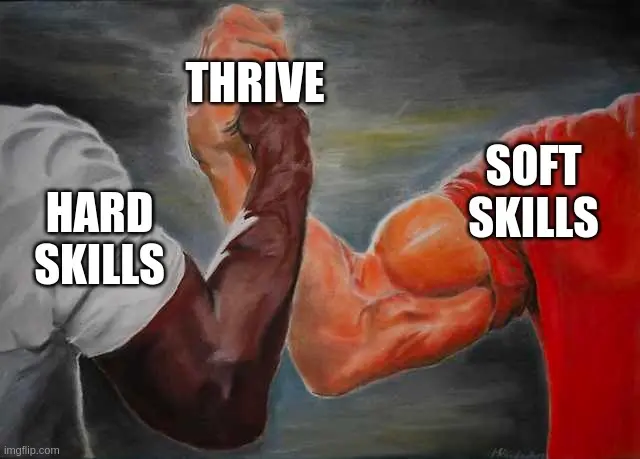
Lesson learned: Don't leave the communication side of the job to managers. You may lock your growth ability. Always ask your clients for feedback. Simple questions like "Are you satisfied with my job?", "How can I improve my service quality for you?" or "Could you give me advice on how I can grow up as a professional?". It won't hurt asking. Sometimes you can spot a pressure point that your client held inside themselves and was unwilling to tell you directly.
Income State:
- 2014, 2nd year of freelance, $20/hour, 120 hours, $2400/month
- 2015, 3rd year, $35/hour, 120 hours, $4200/month
Don't get distracted by hype
I focused on web development and tried to become an expert in it. There were a lot of tech frameworks, programming languages, and other hype things to switch. It is, of course, possible to change the technical stack and earn quite a lot (hello ML and Crypto guys!). But a hype thing can also quickly lose popularity, and you can waste time.
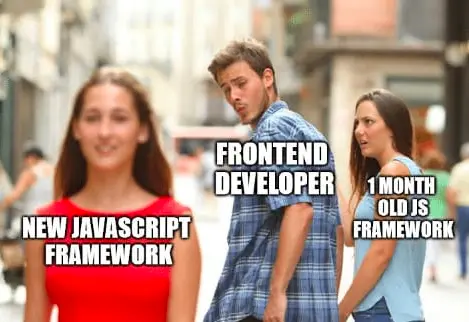
It's hard to figure out whether a new thing is a hype. But if something remains popular for some time - you may check it out. Most probably, by the time you get to it - it becomes more mature, and you don't spend much time trying to find learning resources or fight with bugs of a young framework.
Lesson learned: Getting deep knowledge in a single niche is better than knowing a little in multiple areas while constantly switching.
Income State:
- 2016, 4th year, $45/hour, 120 hours, $5400/month
- 2017, 5th year, $55/hour, 100 hours, $5500/month
Be proactive
While working as a freelancer, I followed the same strategy of asking for more responsibility. This approach allowed me to lead teams and later take a System Architect role in many SaaS startups.
The trick is to show your loyalty and expertise first, then ask. But please avoid faking any of that! People feel when you are not honest with them.
Another behavior that paid well was to dive into my client's business deeper. I discussed with them their business solutions and asked why they decided this or that.
I figured out that I have something to share about other areas too. Little by little, I got some experience in marketing and UI/UX design. It turned out that these skills were beneficial when I started working on my projects.
Lesson learned: Don't try to be just a developer. Let your curiosity serve you.
Income State:
- 2018, 6th year, $75/hour, 100 hours, $7500/month
- 2019, 7th year, $90/hour, 60 hours, $5400/month
Try to get closer to a decision-maker
Build good communication and relationships with your clients to be the first they contact when they need a helping hand.
When you work directly with startup owners, it's completely different from when you have to report to a boss or a manager in an office job. Product owners are happy when you show your involvement by taking an extra step in helping them. You can eventually even become friends with them!
Lesson learned: Being so close to a decision-maker opens doors to a broader range of areas where you can take responsibility and help them. Learning from mistakes and the sound moves of my clients helped me better prepare for my own thing.
And even after the end of my contracts – I kept in touch with my clients. Many times it led to new contracts, big and small. That also gave me opportunities to ask them for a piece of advice about my projects.
Income State:
- 2020, 8th year, $70/hour, 115 hours, $8050/month
- 2021, 9th year, $85/hour, 60 hours, $5100/month
Switch from full-time work to part-time consultations
When people ask you to manage their team, do audits, or consult - congratulations, you reached the final stage of your freelance career.
I raised my hourly rate to meet my desired level of $100 per hour and reduced hours to 5-10 per week. It took me eight years to achieve this level.
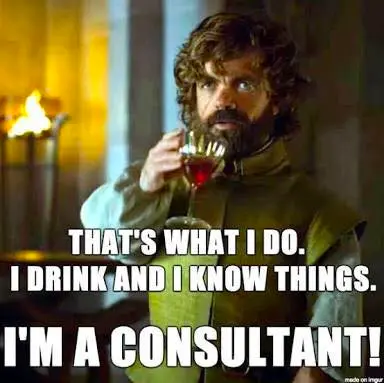
And I finally had 30+ hours of free time every week. It felt natural to use that time for something greater.
Income State:
- 2022, 10th year, $100/hour, 20-40 hours, $2000-4000/month
Start your project.
Once I got both money and free time, it was pretty attractive to rest and travel more. A well-deserved reward, right? I saw a lot of places around the globe and experienced things I did not before. Living like that is fun and I spent good 4 years in that mode. That's why my income during that time was slightly lower than before. But after some time, I felt I wanted something more than just being a freelancer.
I wanted my skills and knowledge of building SaaS startups to be used to my benefit. I was confident that I alone could produce a tool that would help people, and people would be ready to pay for it. I had some personal itches that I wanted to solve. This is how Toread.Today was born, and one more tool will come out soon.
Honestly, I could start working on it a couple of years earlier. But I was too relaxed, and it was hard to switch back to working full-time on something.
Lesson learned: Don't delay to start working towards your dream. Sometimes you have all the resources for it but yet are a bit unsure. Be bold and try. It won't hurt to try!
I'm now on my way to getting my first paying users. My next milestone is to reach $2000 of stable monthly income from my projects to leave freelance consultations and entirely focus on my projects. And I know that won't be an easy goal to achieve.
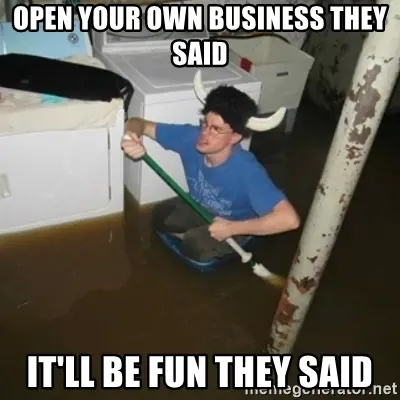
In one of the following articles, I'll keep you updated about my obstacles to that milestone. Make sure you are subscribed to avoid missing it!
Bonus
To ensure you have enough money when you reduce your income – I highly recommend changing the way of living with some degree of minimalism approach.
You don't have to be a crazy fanatic that lives with a single t-shirt, shorts, and a laptop somewhere in Thailand. But some awareness of consumption won't hurt.
When I first tried it, I pushed it to the extreme and reduced the number of things I had to just one big travel backpack. It helped me in my traveling, and I understood that I don't need that many objects around me in the long run.
A way to figure out how many items you really need is simple. Hide everything (you should have plenty of space under your bed) and only take things from there that you will use. You'll see that >80% of the items were not even touched after a week of the experiment.
All of that may sound like weirdo behavior. Still, if something looks stupid but works - it's not that stupid. I reduced my monthly expenses from around $3000 to $1500 for a family of two traveling worldwide. 50%, not bad, huh?
What techniques help you increase your income and amount of free time or
reduce expenses?
Leave
a
comment here.